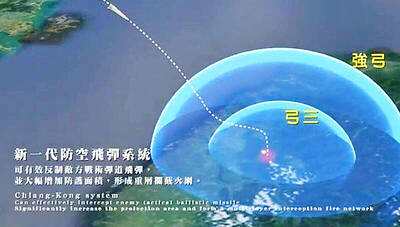Thousands of Chinese earthquake victims fled areas near the epicenter yesterday, fearful of floods from rivers blocked by landslides rattled loose in this week’s powerful temblor.
Soldiers carried older people out of Beichuan Town — one of the areas hit hardest by the magnitude 7.9 quake, whose confirmed death toll jumped to nearly 29,000 — while survivors cradled babies on a road jammed with vehicles and people.
A policeman said that rescue officials were worried water from a choked river would inundate the town.
“The river was jammed up by a landslide; now that may burst. That is what we are worried about,” the policeman said as he hurried by, not giving his name.
“I’m very scared. I heard that the water will be crashing down here,” said Liang Xiao, one of the people fleeing. “If that happens, there will be over 10m of water over our heads.”
Xinhua news Agency said earlier that a lake in Beichuan County “may burst its bank at any time.”
Residents left for higher ground, but 46 seriously injured were still at risk, the agency said.
Further north, a mountain sheared off by the quake cut the Qingzhu River and covered three villages in a valley near Qingchuan.
No traces remained of the villages, swallowed up by a huge mound of earth, behind which water from the river was backing up.
Xinhua said more than 2,000 people were evacuated from near that area.
The confirmed death toll rose yesterday to 28,881, Cabinet spokesman Guo Weimin (郭衛民) said. The government has previously said at least 50,000 people were believed killed in the disaster.
More than 10,600 people remained buried in Sichuan Province, the regional government said, according to Xinhua.
Survivors were still being found under destroyed buildings five days after the quake, as the rescue operation grew to 148,000 soldiers and police.
Rescue teams from South Korea, Singapore and Russia began work yesterday, joining Japanese specialists.

LIMITS: While China increases military pressure on Taiwan and expands its use of cognitive warfare, it is unwilling to target tech supply chains, the report said US and Taiwan military officials have warned that the Chinese People’s Liberation Army (PLA) could implement a blockade within “a matter of hours” and need only “minimal conversion time” prior to an attack on Taiwan, a report released on Tuesday by the US Senate’s China Economic and Security Review Commission said. “While there is no indication that China is planning an imminent attack, the United States and its allies and partners can no longer assume that a Taiwan contingency is a distant possibility for which they would have ample time to prepare,” it said. The commission made the comments in its annual

DETERMINATION: Beijing’s actions toward Tokyo have drawn international attention, but would likely bolster regional coordination and defense networks, the report said Japanese Prime Minister Sanae Takaichi’s administration is likely to prioritize security reforms and deterrence in the face of recent “hybrid” threats from China, the National Security Bureau (NSB) said. The bureau made the assessment in a written report to the Legislative Yuan ahead of an oral report and questions-and-answers session at the legislature’s Foreign Affairs and National Defense Committee tomorrow. The key points of Japan’s security reforms would be to reinforce security cooperation with the US, including enhancing defense deployment in the first island chain, pushing forward the integrated command and operations of the Japan Self-Defense Forces and US Forces Japan, as

INTERCEPTION: The 30km test ceiling shows that the CSIST is capable of producing missiles that could stop inbound missiles as they re-enter the atmosphere Recent missile tests by the Chungshan Institute of Science and Technology (CSIST) show that Taiwan’s missiles are capable of intercepting ballistic missiles as they re-enter the atmosphere and pose a significant deterrent to Chinese missile threats, former Hsiung Feng III missile development project chief engineer Chang Cheng (張誠) said yesterday. The military-affiliated institute has been conducting missile tests, believed to be related to Project Chiang Kung (強弓) at Pingtung County’s Jiupeng Military Base, with many tests deviating from past practices of setting restriction zones at “unlimited” and instead clearly stating a 30.48km range, Chang said. “Unlimited” restrictions zones for missile tests is

PUBLIC SAFETY: The nationwide distribution campaign aims to enhance society’s overall understanding of threats and bolster defense awareness, an official said The latest edition of the National Public Safety Guide is being mailed to all citizens starting today to foster public awareness of self-defense in the event of war or natural disasters, the Ministry of National Defense said yesterday. “The guides will be disseminated to the public to enhance society’s overall understanding of threats and bolster defense awareness, demonstrating the government’s emphasis on people’s safety and its determination to pursue self-defense,” All-out Defense Mobilization Agency Director Shen Wei-chih (沈威志) said at the ministry’s news conference. The nationwide distribution campaign was planned according to President Lai William’s (賴清德) Sept. 20 directive, he said, adding